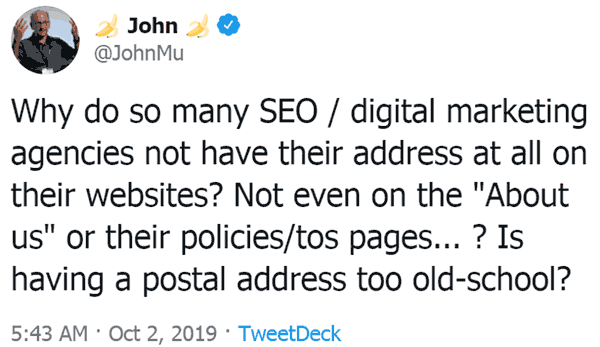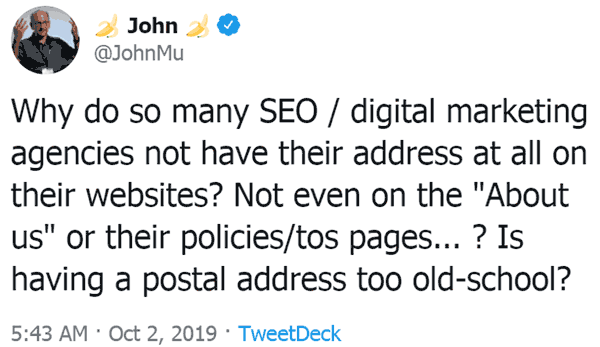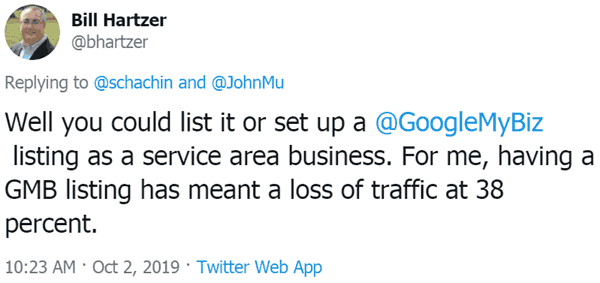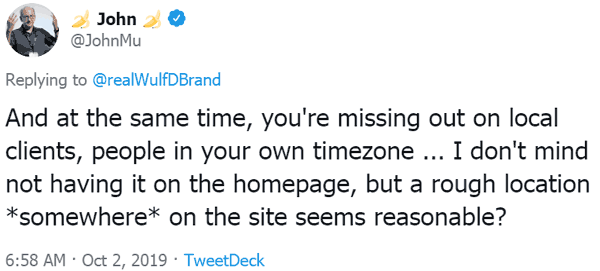The new app is called watchGPT and as I tipped off already, it gives you access to ChatGPT from your Apple Watch. Now the $10,000 question (or more accurately the $3.99 question, as that is the one-time cost of the app) is why having ChatGPT on your wrist is remotely necessary, so let’s dive into what exactly the app can do.
NEWS
Google’s John Mueller Asks Why SEOs Don’t Publish Their Address

Mueller questions why SEOs do not publish addresses on their about page. The SEO community responded with numerous reasons, ranging from it’s a negative ranking effect to they don’t service Local SEO.
Why No Address in SEO Business Sites?
John Mueller said that he was browsing through different SEO sites and noticed that many SEO businesses did not list a physical address. So he turned to Twitter and asked the community why this was so prevalent.
“Why do so many SEO / digital marketing agencies not have their address at all on their websites? Not even on the “About us” or their policies/tos pages… ? Is having a postal address too old-school?”

Reasons Why Not to List Address
Bill Hartzer tweeted a good reason for not listing an address in an about page. He recounted that at one time he listed his address and also created a Google My Business page. He subsequently experienced a 38% drop in traffic.

Google associated his global SEO business with a small geographic area. His site dropped off for his keywords except in the small geographic area in which he lived.
Another member of the SEO community said that publishing an address and making that prominent might cause the perception that the address represents your service area. A limited service area might discourage clients that were outside of that location.
“And at the same time, you’re missing out on local clients, people in your own timezone … I don’t mind not having it on the homepage, but a rough location *somewhere* on the site seems reasonable?”

Local SEO and SEO Are Different
John’s response is reasonable but it overlooks the fact that local SEO clients require a different service from sites that are not local based.
The needs of a local based business that primarily sells locally are dramatically different from a business that sells online to a national or global audience.
Speaking for Myself
Speaking for myself, although I do take some local SEO clients, my focus for the past 20 yeas has been on businesses with more complicated issues like figuring out how to rank better or recovering from an algorithm update. So, adding an address to appeal to potential local clients has never been a consideration.
Geographic Bias
Scott Clark tweeted that, living in Kentucky, he feared that geographic bias might cause unwanted stereotyping:
“We used to hide the fact we’re in KY because of stereotypes that persist even now. Once our avg client ARR passed $50M we stopped worrying. We need to make a living, John, and geo-bias is a real thing.”
John Mueller responded to the many comments by graciously thanking the SEO community for their feedback.
Mueller also tweeted that his question should not be interpreted as having to do with anything search or algorithm related:
“I just want to clarify: this is not related to any search change on our side. It’s purely me having browsed a bunch of legitimate SEO business sites and wondering where folks are based.”
Until Mueller brought this up, I confess to not having given the issue of an address much thought.
So today I updated my about page and added that I am originally from San Francisco but that I currently reside in Western Massachusetts.
How about you? Do you think it’s a good idea to list your address?
Facebook Faces Yet Another Outage: Platform Encounters Technical Issues Again

Uppdated: It seems that today’s issues with Facebook haven’t affected as many users as the last time. A smaller group of people appears to be impacted this time around, which is a relief compared to the larger incident before. Nevertheless, it’s still frustrating for those affected, and hopefully, the issues will be resolved soon by the Facebook team.
Facebook had another problem today (March 20, 2024). According to Downdetector, a website that shows when other websites are not working, many people had trouble using Facebook.
This isn’t the first time Facebook has had issues. Just a little while ago, there was another problem that stopped people from using the site. Today, when people tried to use Facebook, it didn’t work like it should. People couldn’t see their friends’ posts, and sometimes the website wouldn’t even load.
Downdetector, which watches out for problems on websites, showed that lots of people were having trouble with Facebook. People from all over the world said they couldn’t use the site, and they were not happy about it.
When websites like Facebook have problems, it affects a lot of people. It’s not just about not being able to see posts or chat with friends. It can also impact businesses that use Facebook to reach customers.
Since Facebook owns Messenger and Instagram, the problems with Facebook also meant that people had trouble using these apps. It made the situation even more frustrating for many users, who rely on these apps to stay connected with others.
During this recent problem, one thing is obvious: the internet is always changing, and even big websites like Facebook can have problems. While people wait for Facebook to fix the issue, it shows us how easily things online can go wrong. It’s a good reminder that we should have backup plans for staying connected online, just in case something like this happens again.
NEWS
We asked ChatGPT what will be Google (GOOG) stock price for 2030

Investors who have invested in Alphabet Inc. (NASDAQ: GOOG) stock have reaped significant benefits from the company’s robust financial performance over the last five years. Google’s dominance in the online advertising market has been a key driver of the company’s consistent revenue growth and impressive profit margins.
In addition, Google has expanded its operations into related fields such as cloud computing and artificial intelligence. These areas show great promise as future growth drivers, making them increasingly attractive to investors. Notably, Alphabet’s stock price has been rising due to investor interest in the company’s recent initiatives in the fast-developing field of artificial intelligence (AI), adding generative AI features to Gmail and Google Docs.
However, when it comes to predicting the future pricing of a corporation like Google, there are many factors to consider. With this in mind, Finbold turned to the artificial intelligence tool ChatGPT to suggest a likely pricing range for GOOG stock by 2030. Although the tool was unable to give a definitive price range, it did note the following:
“Over the long term, Google has a track record of strong financial performance and has shown an ability to adapt to changing market conditions. As such, it’s reasonable to expect that Google’s stock price may continue to appreciate over time.”
GOOG stock price prediction
While attempting to estimate the price range of future transactions, it is essential to consider a variety of measures in addition to the AI chat tool, which includes deep learning algorithms and stock market experts.
Finbold collected forecasts provided by CoinPriceForecast, a finance prediction tool that utilizes machine self-learning technology, to anticipate Google stock price by the end of 2030 to compare with ChatGPT’s projection.
According to the most recent long-term estimate, which Finbold obtained on March 20, the price of Google will rise beyond $200 in 2030 and touch $247 by the end of the year, which would indicate a 141% gain from today to the end of the year.
Google has been assigned a recommendation of ‘strong buy’ by the majority of analysts working on Wall Street for a more near-term time frame. Significantly, 36 analysts of the 48 have recommended a “strong buy,” while seven people have advocated a “buy.” The remaining five analysts had given a ‘hold’ rating.

The average price projection for Alphabet stock over the last three months has been $125.32; this objective represents a 22.31% upside from its current price. It’s interesting to note that the maximum price forecast for the next year is $160, representing a gain of 56.16% from the stock’s current price of $102.46.
While the outlook for Google stock may be positive, it’s important to keep in mind that some potential challenges and risks could impact its performance, including competition from ChatGPT itself, which could affect Google’s price.
Disclaimer: The content on this site should not be considered investment advice. Investing is speculative. When investing, your capital is at risk.
NEWS
This Apple Watch app brings ChatGPT to your wrist — here’s why you want it

ChatGPT feels like it is everywhere at the moment; the AI-powered tool is rapidly starting to feel like internet connected home devices where you are left wondering if your flower pot really needed Bluetooth. However, after hearing about a new Apple Watch app that brings ChatGPT to your favorite wrist computer, I’m actually convinced this one is worth checking out.
-

 PPC6 days ago
PPC6 days ago19 Best SEO Tools in 2024 (For Every Use Case)
-

 MARKETING7 days ago
MARKETING7 days agoEcommerce evolution: Blurring the lines between B2B and B2C
-
SEARCHENGINES5 days ago
Daily Search Forum Recap: April 19, 2024
-
SEARCHENGINES6 days ago
Daily Search Forum Recap: April 18, 2024
-

 WORDPRESS6 days ago
WORDPRESS6 days agoHow to Make $5000 of Passive Income Every Month in WordPress
-

 SEO7 days ago
SEO7 days ago2024 WordPress Vulnerability Report Shows Errors Sites Keep Making
-

 WORDPRESS6 days ago
WORDPRESS6 days ago10 Amazing WordPress Design Resouces – WordPress.com News
-

 SEO6 days ago
SEO6 days ago25 WordPress Alternatives Best For SEO















